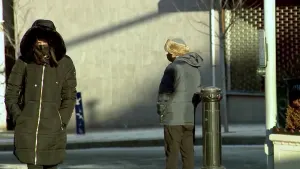More Stories
When you go to the pharmacy, you expect to get the right
prescription. But a Kane In Your Corner investigation finds 100,000 people
a year fall victim to prescription mistakes, which could have serious or
potentially deadly consequences. A national pharmacists association says the
problem is being fueled in part by heavy workloads faced by pharmacists.
Lynne Calloway thought she was just getting a refill of her
arthritis medication but wound up with something very different.
“By the second day or so I was feeling not right,” Calloway
says. She says she was suffering from body aches and nausea.
It could have been a lot worse: instead of her usual
arthritis medicine, the pharmacy had given her a chemotherapy drug.
In 2016, News 12 reported on how Willie Scott of Newark
wound up bandaged from the shoulders down, his body covered in blisters – after
he received the wrong medication and his body had a severe allergic reaction.
In Scott’s case, he received a prescription intended for someone else.
The U.S. Food and Drug Administration receives more than
100,000 reports of medication errors each year, according to a 2019 report. Kane In Your Corner
checked the FDA’s adverse event reporting database and found complaints for everything from patients getting the wrong dose to the
wrong drug entirely.
MORE: Kane In Your Corner
“It's a big problem and it's very significant,” says Al
Carter, executive director of the National Association of Boards of Pharmacy.
Carter says increased workloads on pharmacists are fueling a recent rise in
errors and says his group “actually had a couple of taskforce meetings recently
that focused specifically on working conditions.”
The increased workload is evident in Vermont, where state
regulators filed a 40-page complaint earlier this year against Walgreens, alleging the drug chain was so
short-staffed that it sometimes operated stores without a pharmacist present.
One store reported 20 medication errors in 2021 alone. Walgreens declined Kane
In Your Corner’s request for a comment.
And earlier this year, CVS announced that it would would start closing pharmacies for half an hour a day
so pharmacists could get a meal break.
“Workload is definitely a stressor that can add to
prescription errors,” Carter says. “Being in an environment where you're working
in extended periods of time, where you're filling numerous prescriptions, while
providing immunizations, it can add up.”
Perhaps because of that heavy workload, few pharmacists are
held accountable for mistakes.
Public records show that since 2019, New York disciplined 22
pharmacists for prescription errors with the most common form of discipline
being a fine.
The Connecticut Department of
Consumer Protection says it received at least 320 complaints about
pharmacy errors since 2019, but spokesperson Kaitlyn
Krasselt says just nine cases “resulted in a letter of reprimand.”
The New Jersey Division of Consumer Affairs says that since
2019, it has taken disciplinary action in only three cases involving
prescription errors.
Experts advise consumers to be proactive in preventing pharmacy
errors. They suggest checking the name to make sure it’s the right
prescription. If the name is common, double check the address and date of
birth. If the pills look different, don’t assume it’s a different generic; do
an internet search of the pill and its markings. And if anything seems off, ask
questions.
The Calloways say they’re fortunate. Despite getting the
wrong medication, Lynne suffered no lasting ill effects.
If you want to report a pharmacy error or other adverse
medical event, you can do so by using the FDA’s adverse event reporting system.
If you have a consumer question or a story that needs to be investigated, click here to see how you can get Kane in Your Corner.
More from News 12
1:31

What's Cooking: Uncle Giuseppe's Marketplace's prime rib roast
1:27

What's Cooking: Uncle Giuseppe's quiche lorraine
2:34

Guide: Safety tips to help prevent home burglaries
0:48

How to protect yourself against frostbite during arctic chill
2:19

Guide: Safety measures to help prevent fires and how to escape one
2:07
